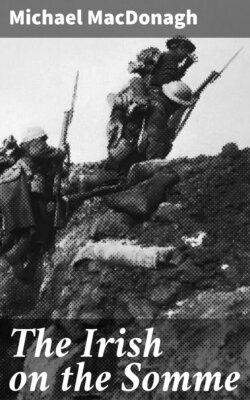Читать книгу The Irish on the Somme - Michael MacDonagh - Страница 11
На сайте Литреса книга снята с продажи.
BRILLIANT ADDITIONS TO THE RECORD OF IRISH VALOUR AND ROMANCE
ОглавлениеThe most signal proof of the exceptional gallantry of the Ulstermen is afforded by the awarding of four Victoria Crosses to two officers and two privates of the Division. There is many a Division that has not won a single V.C. They must not be belittled on that score; their ill-fortune and not their service is to blame. But the rarity of the distinction, and the exceptional deed of bravery and self-sacrifice needed to win it, reflects all the more glory on the achievements of the Ulstermen. By the winning of four Victoria Crosses the Ulster Division have made a name which will shine gloriously for all time in the imperishable record of British gallantry on the battlefield.
Private William Frederick McFadzean of the Royal Irish Rifles was posthumously awarded the Victoria Cross for sacrificing himself deliberately to save his comrades. The men of the battalion were packed together in a concentration trench on the morning of July 1. Just prior to the advance bombs were being distributed for use when the German lines were reached. One of the boxes of these missiles slipped down the trench and emptied its contents on the floor. Two of the safety pins fell out. Shouts of alarm were raised. Men who would face the German bombs undaunted shrank with a purely physical reaction from the peril which thus accidentally threatened them. They knew that in a moment these bombs would explode with a terrific detonation and scatter death and mutilation among them. In that instant McFadzean flung himself bodily on the top of the bombs. He was a bomber himself, and he well knew the danger, but he did not hesitate. The bombs exploded. All their tremendous powers of destruction were concentrated upon the body which enveloped them in an embrace. McFadzean was blown literally to bits. One only of his comrades was injured.
McFadzean was only twenty-one years of age. He was born at Lurgan, County Armagh, and was a Presbyterian. A member of the Ulster Volunteer Force, he joined the Young Citizens' Battalion (Belfast) of the Royal Irish Rifles in September 1914.
The other private who won the Victoria Cross is Robert Quigg, also of the Royal Irish Rifles. On the morning after the advance he went out seven times, alone and in the face of danger, to try to find his wounded officer, Sir Harry Macnaghten of Dundaraye, Antrim, and returned on each occasion with a disabled man. Private Quigg is thirty-one, the son of Robert Quigg, a guide and boatman at the Giant's Causeway, Antrim. He was a member of the Ulster Volunteer Force, and enlisted in the Royal Irish Rifles (Central Antrim Volunteers) in September, 1914. He is an Episcopalian, an Orangeman and a member of the flute band of his lodge.
The official account of Private Quigg's exploit is as follows—
"For most conspicuous bravery. He advanced to the assault with his platoon three times. Early next morning, hearing a rumour that his platoon officer was lying out wounded, he went out seven times to look for him under heavy shell and machine-gun fire, each time bringing back a wounded man. The last man he dragged in on a waterproof sheet from within a few yards of the enemy's wire. He was seven hours engaged in this most gallant work, and finally was so exhausted that he had to give it up."
It was also "for most conspicuous bravery" in searching for wounded men under continuous and heavy fire that Lieutenant Geoffrey Shillington Cather of the Royal Irish Fusiliers got the Victoria Cross. He lost his life in thus trying to succour others on the night and morning after the advance of the Ulster Division. "From 7 p.m. till midnight he searched 'No Man's Land,' and brought in three wounded men," says the official account. "Next morning, at 8 a.m., he continued his search, brought in another wounded man, and gave water to others, arranging for their rescue later. Finally, at 10.30 a.m., he took out water to another man, and was proceeding further on when he was himself killed. All this was carried out in full view of the enemy, and under direct machine-gun fire, and intermittent artillery fire. He set a splendid example of courage and self-sacrifice."
Lieutenant Cather was twenty-five years of age, a son of Mrs. Cather, Priory Road, West Hampstead, London. His father, who was dead, had been a tea merchant in the City. On his mother's side, Lieutenant Cather was a grandson of the late Mr. Thomas Shillington, of Tavanagh House, Portadown; and on his father's side, of the late Rev. Robert Cather, a distinguished minister of the Irish Methodist Church. He was a nephew of Captain D. Graham Shillington, of Ardeevin, Portadown, who, with his son, Lieutenant T.G. Shillington, was serving in the same battalion of the Royal Irish Fusiliers. Lieutenant Cather was educated at Rugby. He first joined the Public Schools' Battalion of the Royal Fusiliers (City of London Regiment), and obtained his commission in the County Armagh Volunteers in May, 1915.
The second officer of the Ulster Division to win the Victoria Cross was Captain Eric N.F. Bell of the Royal Inniskilling Fusiliers, whose gallantry on July 1 also cost him his life. He was about twenty-two years old, one of three soldier sons of Captain E.H. Bell, formerly of the Inniskillings (serving in Egypt in a garrison battalion of the Royal Irish Regiment), and Mrs. Bell, an Enniskillen lady living in Bootle. The two brothers of the late Captain Bell hold commissions in the Ulster Division. The deeds for which he was awarded the Victoria Cross are thus set out in the official account—
